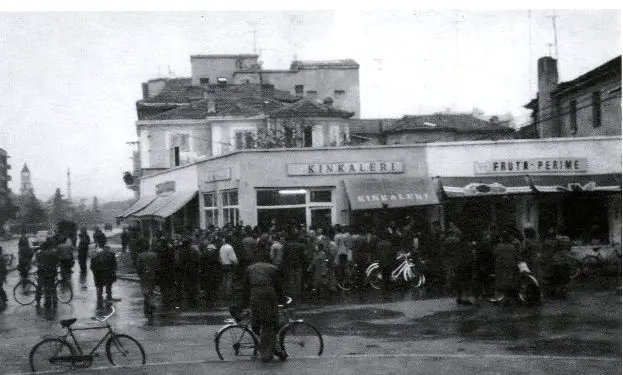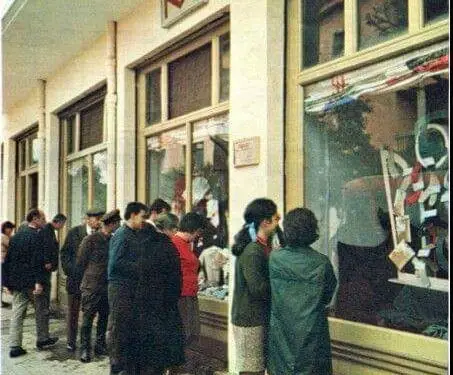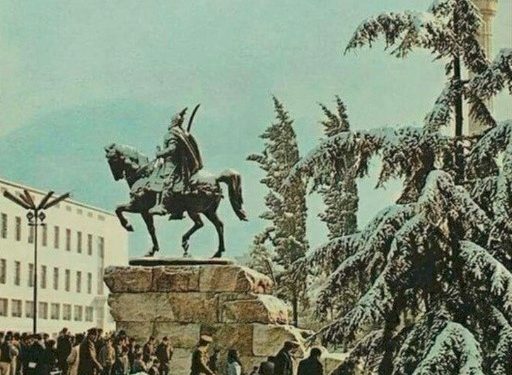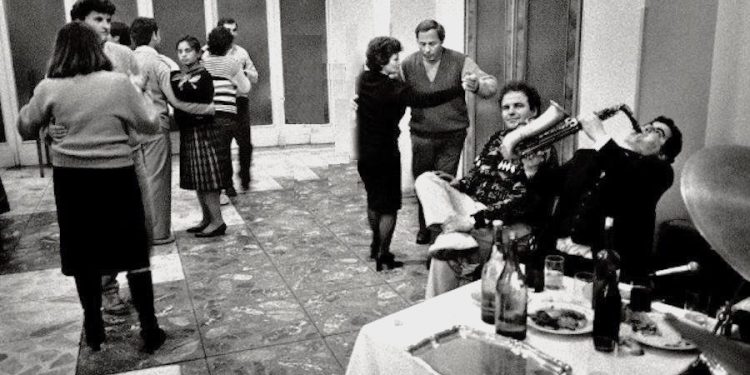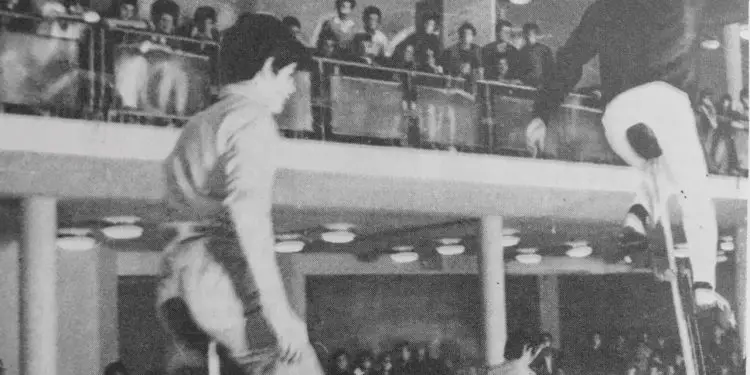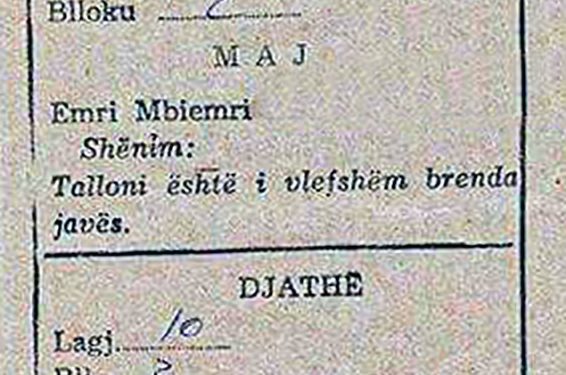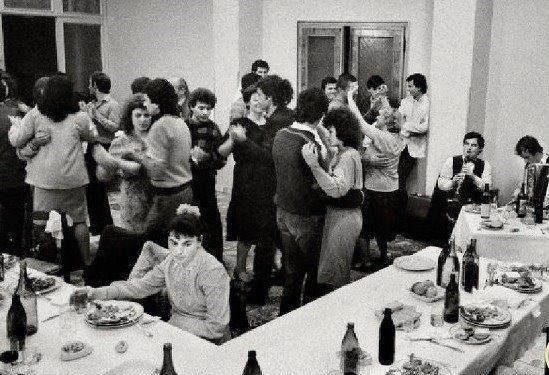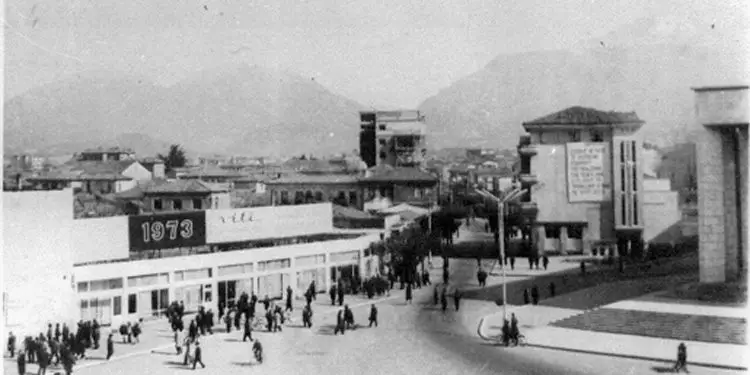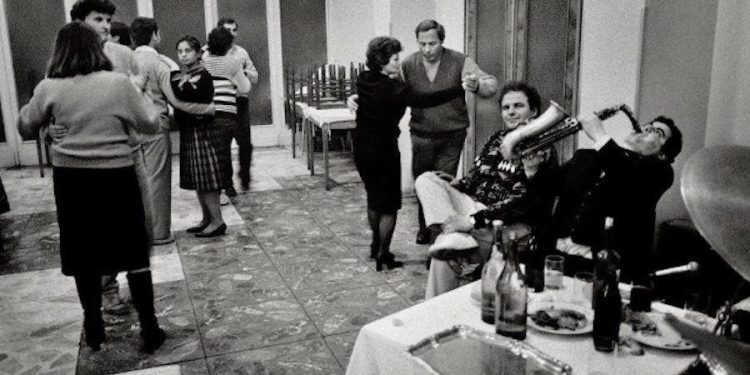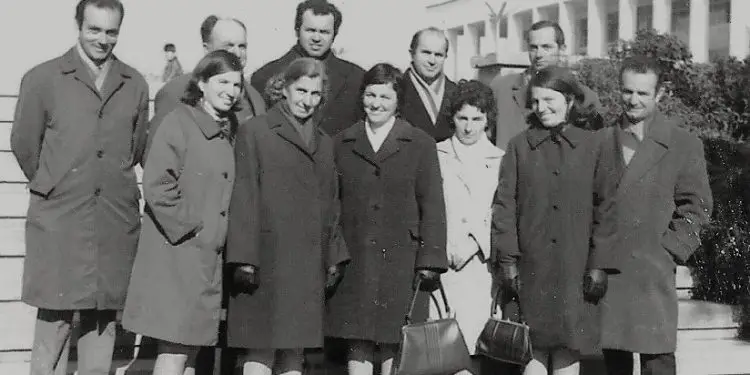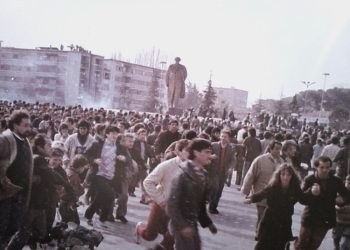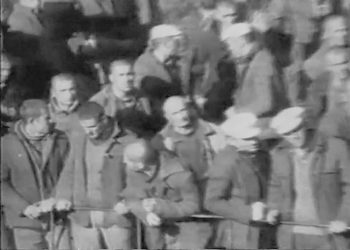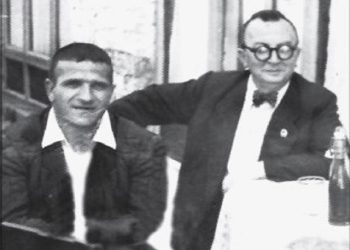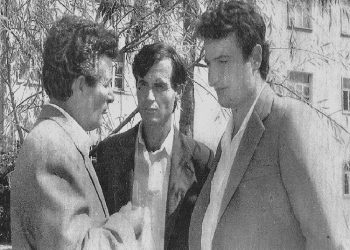From Uvil Zajmi
Memorie.al / New Year, it was the party that everyone was waiting for. In the poor Albania of the communist dictatorship of Enver Hoxha and his successor, Ramiz Alia, it seemed as if everything was forgotten that night. Going back in time brings to mind the traditional way of celebrating in every Albanian home. Small rituals, parties in bars and the most famous hotels of the time. Menu, music and prices. Where the residents of the former Block of the high communist leadership of the time celebrated.
Work, leisure and football
Colorful ribbons of paper, rubber toys, the smell of burning wood coming from the stove pipe, mixed with that of freshly roasted turkey, are the memories that take us back in time to the New Year’s celebrations over the years of the dictatorship. End of year’s atmosphere in Tirana before the 90s.
Today, it may seem like a routine holiday. You can celebrate when you want and what you want, but at that time, this was the only celebration that was not related to the party, and the reasons why it was long-awaited were many. The ban on religion in Albania limited the end-of-year holidays simply and only to the night of the change of years, or New Year.
Christmas was no longer celebrated, so all attention was focused on December 31st. The heaviest burden fell on the housewives, who, in addition to having to work even on the 31st, had to start cooking for dinner.
And for them it seemed that there was no party, just a run around the kitchen. In the last days of the year, a big reception was organized in the “Palace of Brigades” by Enver Hoxha with distinguished pioneers, while Christmas Day was no longer celebrated after 1967, when religion was banned by law. Families of the Catholic and Orthodox faiths celebrated it in secret, without noise and commotion, only in close circles between them.
In the meantime, work was done the previous Sunday, so that this would replace January 2nd, which was a holiday, and on the 3rd, everyone would return to work. Small financial rewards were given to those who distinguished themselves, while on New Year’s Eve, as well as on January 1 and 2 in enterprises, departments, etc., the duty was done every two hours by employees, who alternated according to a schedule made by the directorate. The women and girls did not do the guard.
The special thing of December 31 was the football match that took place in the field of the Palace of Pioneers, (the pitch black with coal), overflowing with people. It turned into an attractive tradition, in which the most famous football players of the three clubs of the capital played, or well-known names, public figures, such as actors of the People’s Theatre, Albanian Radio-Television, Cinematography, etc.
The meeting was even watched from outside the enclosure beyond Lana, as there was no space for all the spectators within the small territory. During the day of December 31, the city was buzzing and the shops were busy, until the last minute and people were running to get the things they lacked, such as turkey, meat, salami, dairies, etc.
All this until the early hours of the evening, then everyone at home and the city was occupied by a total silence, and only the lighting, it was the one that gave it life, as everything seemed to be asleep. To come alive again, after 12 o’clock at night, when it was filled with young people, who gathered in its center.
RTSH and the “Big Concert”, for all Albanians
Televisions of the “Adriatik”, “Butrinti”, “Iliria”, “Lura” or “Dajti” brands have been the only means of communication that have accompanied Albanians on New Year’s Eve, as well as the following ones. Sitting at the tables, and waiting for 12 o’clock at night, everyone attended the “Big New Year’s Concert”.
It was a program with songs, dances and humor from all over Albania, prepared by the Albanian Radio-Television, which started after the TV Magazine at 20:00 and the show “Time Today and Tomorrow”, by the unforgettable Petrit Leka, continued until 02:00 a.m., to continue with the final night of the Song Festival on RTSH – rebroadcast (those who had the famous jugs followed the programs of foreign channels).
There was no welcome address from the head of state at midnight. The next day, the Italian channel “Rai 1” was opened, only to follow at 12 o’clock in the morning, the Vienna Concert (with the famous conductor, Herbert Von Karajan), and in the evening, again with RTSH in the almost identical program, like that of the night before, everything within the allowed framework.
In not a few cases, there was also a risk of the lights going out due to the large electrical load. The night of the end of the year was also celebrated in military units, dormitories, etc., where unlike the menu of all days of the year, on that night; the soldiers were given extra, a ration of halva, prepared in the soup pot by the cook of the unit. Of course with television, radio, or any tape recorder. Even in hospitals, homes for orphaned children, of course with the simplicity and modesty of the time these institutions had.
Same menu for everyone
New Year’s Eve was almost the same for everyone. A chicken, or turkey, taken with vocher a month ago and, fed with olives in the palace bathroom or backyard, mayonnaise and baklava or kadaif. brandy, if you could find Skrapar or Përmet, was a pleasure, and wine of the brand “Riesling”, “Tokai”, or “Shesh i zi”, or “white”, “Merlot”, “Kallmet” of the second quality, which it cost 42 ALL, or from the Milot Wine Factory, since it was easier to find. The first quality, like “Pino Nero”, had another destination.
The beer was bottled from the “Ali Kelmendi” Food Factory in Tirana or the Korça Beer Factory, or “Panda”, as the people of Korça called it. The ovens were very busy. You took the pan and took a piece of paper with a number, which corresponded to a sheet of metal that the baker stuck on the chicken. But often, due to the fact that almost all the dishes were cooked the same, it happened that they were confused by the bakers, or as they are known otherwise, “tavapekesi”, which were different from each other, and they got into trouble with housewives or family members who they went to get the pans and couldn’t find their pan.
In this regard, I remember from the city of Shkodra, (when we went not infrequently to celebrate the new year, to our Libohovite aunt, who was married in that city), the proverbial saying, that the people of Shkodran attached to the famous tavapeksi named Panto, with origin from the Serbo-Montenegrin minority of that city:
People took spare bread, as the shop was closed for two days. The preparation for New Year’s Eve was very tiring for the women, who cooked non-stop throughout the day, in the conditions of the narrow and not at all comfortable spaces of the apartments built during socialism, mainly in the WC.
Privileged were the families who had secured some lemon or orange seed from the coast, as something rare for the time. In many cases, there were groups of young people, friends and comrades, who gathered that night at someone’s house, to go out in the square after 12 midnight.
A different party in Tirana…!
Tirana, as the capital of the country, has always given a different pace to the holidays, especially the moments before the change of years. The night between two years, for those who remember it, especially between the 60s and 70s, was special. A few moments before the two hands of the big clock came together, hundreds of young men and women could be found in the square in front of the Great Palace of Culture (built in 1964), celebrating, imitating and singing popular songs, mostly foreign.
Everything spontaneous, not organized, but invented by some enthusiasts, who lived mainly in the center of Tirana, since the other areas were a bit far and difficult to get to, when there were no means of transport at those hours. Someone came with brougham wearing a black suit, borsalina or top hat, imitating the actors Jean Mare or Alain Delon, riding the columns, and wishing the New Year in French, someone else sang famous songs of the time, those of John Holliday, &c.
Local fashion
At home or in the bar, this has been the dilemma of Albanians for the night of the change of weather. The preference to spend New Year’s Eve in a public place, with company, orchestra, music and dancing, started before the 50s, to continue in the 60s, and further, especially in the years The 80s. In many cities of Albania, but especially in Tirana, it was different.
It was mainly celebrated in “Kursalin”, famous in the center, the giant halls of “Hotel Dajt” or, in “Vollga” (“Drini”), which, on New Year’s Eve, were filled with rulers, high officials, artists and well-known athletes, with their families, but also with many foreigners, sailors, students and mainly embassy employees, who sang and danced all kinds of music until dawn.
In the same way, it was also celebrated at the Club of the Union of Writers and Artists, at the headquarters next to the People’s Theater, at the Central House of the Army, on “Rrugë e Kavaja”, where the major officers had fun with their families and, years later, in what today it is the headquarters of the Democratic Party.
But also at the “International” or “Donika” hotels. Very special was the “Vollga” or “Adriatik” in Durrës, where not only the people of Durrës, but also foreigners, captains and sailors of ships, who spent the New Year in the port of Durrës, flocked. Even there music, entertainment without limits.
In Shkodër, well-known bars have been used, such as; “Big Coffee”, “Old Tourism”, “Moscow Coffee” or “Adriatik”. In the same way, in other cities, the bars that had an orchestra, that could be cooked and with large halls were used.
Everything until the “programmatic” speech of Mati and the great popular march of the people of Tirana towards Durrës, in December 1966, to honor the heroic act of Adem Reka. (“Hero of Socialist Labor” who gave his life to save a large loading unloading crane, or as it was otherwise known: Biga Lundruese).
Then another phase of liberalism for a few years, until February 1973, after which New Year’s Eve is only family.
The long wait to get kerosene, with the 5-, 10- or 15-liter drums, which we used to line up, the saleswoman wearing long woolen socks, the kerosene barrel, the kerosene and the big funnel she placed at the mouth of each binodi, to throw away the kerosene. 12 ALL (old) cost a liter. Likewise, it was a great embarrassment and endless adventure to find the calendars that we hung on the walls of the waiting rooms, which were sold in the last two or three days before the New Year.
Hotel – “15 floors” and return to the bar with selected music and dance
Although there was an inhibition of this type of public entertainment, especially between the 70s and 80s, as a result of tense political-economic situations and limited social life, the return to the fun night of the end of the year in restaurants came naturally from the desire to something different from that of staying, cooking at home, the day and night of December 31st. This was the motive that pushed Albanians to start organizing again in bars on the last night of the year. Not only in Tirana, but also in other cities…!
But to spend this night in a bar was considered a great privilege, as not everyone had the opportunity. In order to secure a table for the New Year’s Eve, he had to make a family reservation, in the first days of December, near the hotel’s administration. The 15-story one, newly built and inaugurated in 1979, was mostly frequented. Everyone used to run there first. If you did not manage to make a reservation, you had to rush to other bars, such as; “Vollga” (“Drini”), “Arbana”, “Arbëria”, or “Rinia”, where New Year’s Eve was accompanied by light music, dancing and fun, within the time limits.
The orchestra (mainly that of the 15-story tavern, or others, made up of well-known instruments of the capital), knew the repertoire well and never missed a mark, always in tune with what was allowed in the previously controlled program, but never, music and songs dedicated to the Party. Three jumps, a pause, three more jumps… and so on.
Prices
The festive evening started at 21:00. The price varied from 600 ALL (old) per person and 1,200 ALL for a couple on the 15th floor, to go down to 450 ALL, on the others with a menu with the usual ones, such as antipasti, then chicken or pilaf with turkey, steak with potatoes, a bottle of wine, beer or brandy and dessert at the end. Cigarettes were smoked endlessly, there were no singers, but singers who were in the bar, with their families, or amateur singers could sing.
At 00:00 it was lights out, glasses clinked and a kiss on the cheek, then I went outside to watch the fireworks. Afterwards, lottery games were also organized, with well-known actor presenters, such as Vilson Gjonçaj, with which the winners received a gift from the organizers. Staying in the restaurant continued almost until the early hours of the morning, as there was no limit or time limit. Even in Shkodër, at Hotel “Rozafa”, or on the beach of Durrës, both at “Adriatiku”, as well as at “Kruja”, “Butrinti”, “Apollonia”, etc., the same thing happened.
Booking holidays in the mail at 12:00, a year in advance!
The New Year started with a run at midnight to the Central Post Office, not to make a wish, but to send an urgent telegram to the favorite beach hotels, such as “Kruja”, “Butrinti”, or those in Saranda and Pogradec. This action over the years had turned into anxiety for the people of Tirana and as soon as the clocks passed 12 and a minute, a member of the family, including those who were in the bar, had to sacrifice and quickly leave for the post office, where meanwhile a flow was directed great people. All of them, to make the famous telegram and get the mandate, which ensured a reservation of ten days, in one of the rooms of these tourist hotels.
Visits to relatives and the “luck” brought by the first visitor
Anyone who lived through those times no doubt remembers the grueling family visits that began at noon on the 1st and continued for several days. Very important, the man was seen entering the house. He was the one who would “determine” the fate of that year. He went to relatives, neighbors, friends… on foot or with the rare, overcrowded buses, since the taxis that operated until the 70s were no longer there. It was a tradition that was practiced for years, throughout Albania, and that slowly died out with the change of systems, and as if due to inertia, it continued until 1996.
Hotel “Dajti”, dance and western music…!
For many decades Hotel “Dajti” has served as the only government and diplomatic hotel in Albania. But also to organize prominent world personalities, who came to Tirana, well-known western teams, such as the football team of the Federal Republic of Germany, “Ajax”, well-known artists, etc., etc. Immediately after the war, it was used as a residence for work and residence, even Enver Hoxha and several high-ranking government officials of the time were married there. “Dajti”, together with the “Brigadave” Palace, are used to celebrate everything, but especially the big evening of the end of the year.
Being in the center, “Dajti” was a favorite, as its internal structure, with its gigantic luxurious halls, with space and height, excellent function (the tavern below, very favorite, was not only used for New Year’s Eve New, due to its small size), created a great opportunity for entertainment, for foreign specialists, first the Yugoslavs, those from the eastern countries present in Albania, and then the Soviets and Chinese, (who had come here for the construction works of 5-year-olds), diplomats, but also for Albanians.
Until the break with the communist countries of Eastern Europe, or as they were otherwise known as; “People’s Democracies”, until around the 60s – 61s, people with money went there, who knew life from their parents, who were educated in the West, families of doctors, intellectuals, well-known sportsmen, the children of high leaders of PPSh, artists, etc. They gathered in the large hall and in the modern hall-salon (which guaranteed over 250 people), during the New Year’s Eve. They cooked very well there and the food was of high quality and variety.
Mrs. Carmon, the modern ballroom woman
Mrs. Carmon was very elegant, known not only as the wife of Pascal Carmon, the First Secretary of the French Embassy, but more for the modern leather clothing she used. Likewise, the daughters of the Polish ambassador, since New Year’s Eve, appeared in classic miniskirts, being the center of attention. Protagonists were also the women, the daughters of officials of Western embassies, who gave life to entertaining balls, which continued after midnight.
This attendance of “Dajti” continued due to inertia after the 60s, even for several more years, almost until the beginning of the 70s. Entry, attendance in general and especially on New Year’s Eve, was only for foreigners and limited elite of selected persons and families. The change was obvious, not modern music, but Albanian and foreign, mainly with the songs of the time. The surveillance of foreigners and Albanians who preferred Hotel “Dajtin” has already begun.
New Year in the “Block”, with the families of the top leadership
The New Year in the “Block” of the senior leadership of the PPSh was special; this is also related to the time. Initially, in the period after the war, and following the 50’s and 60’s, the New Year’s party was organized as a family by all the members of the Political Bureau, who gathered in the Chamber of the “Palace of Brigades”, as the environment was called , in which they spent the night of change.
Over the years, families began to prefer the Central House of the People’s Army (SHQUP), while the separated children celebrated at “Villa no. 2” (today near RTSH), but also at Enver Hoxha’s house, when he was not there. After the 70s, exactly after 1973, when the attacks of “enemy groups” began, in art-culture, army, economy, oil, etc., friendships, ties and preferences were broken, each family gathered at home, inside the “Block”, restricted and guarded with soldiers, security officers and police, without much noise, he spent the New Year.
Also due to the fact that their adult children were married and had small children, which made it necessary to go out or move in public places. The next day, the traditional visits followed. A change in mentality was seen at the end of the 70s, when the children of a few high-ranking officials began to go to the “Dajti Hotel”, prohibited for Albanians, or to go abroad for the end of the year holidays, something that had never been done before. /Memorie.al




